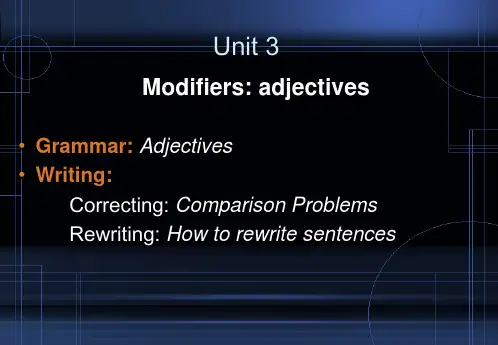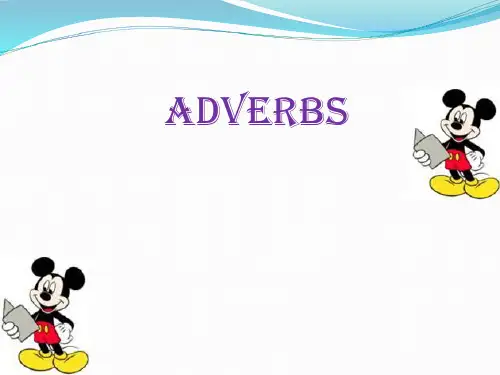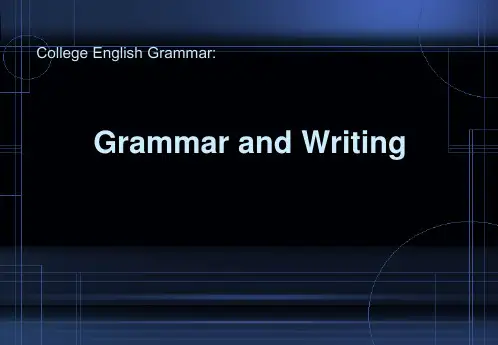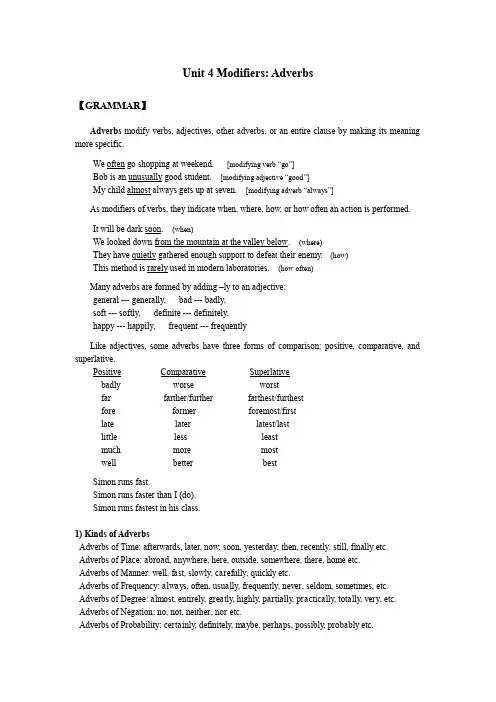《大学英语语法》课件—04Modifiers:Adverb
大学英语语法3形容词ppt课件

Adjectives
• An adjective is a word that modifies a noun or a pronoun by limiting its meaning. It tells a characteristic or quality of a noun or pronoun. Adjectives tell such things as which one? what kind? whose? how many/much?
Exercises 1: Combine the sentences in each set into a single clear sentence which represents
The comparative degree compares two nouns or pronouns: one holds a greater or lesser degree of a quality than the other.
Single syllable adj.: adj.-er Two-syllable adj.: more + adj (-ful/ -re). (more careful, more mature);
• Your story is interested. • My story is very interested. • Your story is not so interested as mine.
When we make a comparison of quantity, we use the structure “as + much/many n. + as” or “as + few/little n. + as”
副词Adverbs ppt课件

Adverb of manner
1.They watched Carefully. 2.The flower was beautifully made up 3.She seemed faintly. 4.The team played wonderfully.
Adverbs of Frequency
the manner, place or time of an action.
Commonly adverbs are formed from adjectives. Some are below.
Many adverbs end with ly. You make these
adverbs by adding ly to adjectives.
Adverbs of Time:
Some adverbs and adverb phrases answer the question “when?”. They are called adverbs of time.
Examples :
The train has already left. We moved into our new house last week. Our favorite T.V. program starts at 6’o clock. I’m going to my new school tomorrow.
It shows how many times an action is done.
It describes the purpose or reason for the action.
Kinds of Adverbs
Quantity/Degree Affirmation /Negation
《大学英语语法》课件—03Modifiers adjectives

Adjectives
• An adjective is a word that modifies a noun or a n by limiting its meaning. It tells a characteristic or quality of a noun or pronoun. Adjectives tell such things as which one? what kind? whose? how many/much?
attributive adjectives predictive adjectives the big house → The house is big.
a popular singer → The singer is popular.
Some words can only be used as predictive adjectives. They have no degree of comparison and cannot be modified by degree adverbs such as too, very, much, almost, nearly, enough, hardly and so on.
Modifiers
A modifier is any word that acts to describe or qualify another word in such a way that it enriches the other words meaning. It usually may be an adjective, an adverb or a prepositional phrase. Adding modifiers can make sentences more explicit, more interesting and more powerful. Let’s look at an example.
Unit 4 Grammar-modifers-adverb

Unit 4 Modifiers: Adverbs【GRAMMAR】Adverbs modify verbs, adjectives, other adverbs, or an entire clause by making its meaning more specific.We often go shopping at weekend. [modifying verb “go”]Bob is an unusually good student. [modifying adjective “good”]My child almost always gets up at seven. [modifying adverb “always”]As modifiers of verbs, they indicate when, where, how, or how often an action is performed.It will be dark soon. (when)We looked down from the mountain at the valley below. (where)They have quietly gathered enough support to defeat their enemy.(how)This method is rarely used in modern laboratories. (how often)Many adverbs are formed by adding –ly to an adjective:general --- generally, bad --- badly,soft --- softly, definite --- definitely,happy --- happily, frequent --- frequentlyLike adjectives, some adverbs have three forms of comparison: positive, comparative, and superlative.Positive Comparative Superlativebadly worse worstfar farther/further farthest/furthestfore former foremost/firstlate later latest/lastlittle less leastmuch more mostwell better bestSimon runs fast.Simon runs faster than I (do).Simon runs fastest in his class.1) Kinds of AdverbsAdverbs of Time:afterwards, later, now, soon, yesterday, then, recently, still, finally etc. Adverbs of Place: abroad, anywhere, here, outside, somewhere, there,home etc.Adverbs of Manner: well, fast, slowly, carefully, quickly etc.Adverbs of Frequency: always, often, usually, frequently, never, seldom, sometimes, etc. Adverbs of Degree: almost, entirely, greatly, highly, partially, practically, totally, very, etc. Adverbs of Negation:no, not, neither, nor etc.Adverbs of Probability: certainly, definitely, maybe, perhaps, possibly, probably etc.Adverbs of Interrogative: when, where, how, why etc.Others: also, too, only etc.This is to act first and report afterwards.You will find the text somewhere in the Bible.This product sells well abroad.Sometimes I feel so worthless!Remember almost nothing happens by accident.There is no limit to practice nor to innovation.Reading for many hours will certainly tax your eyes.Flowers soon fade when cut.Also like learning English, persist makes miracles!2) Position of adverbsWhen an adverb modifies an adjective or another adverb, the modifying adverb must immediately precede the word modified.The prices are quite reasonable.We are very much hoping you can attend our wedding.When an adverb modifies a verb, it has three positions in a sentence: front (before the subject), middle (between the subject and the main verb) and end (after the verb or object).Sometimes I feel quite lonely.“Mathematics” is sometimes abbreviated to “math”.I can not sense your meaning sometimes.The adverb should not be put between the verb and the object:✈She picked up slowly the gun.She picked up the gun slowly.However, adverbs should always come after intransitive verbs (= verbs which have no object).Ill weeds grow fast.It pays to work honestly.Also, some common adverbs (well, badly, hard etc.) are almost always placed after the verb.They suffered badly during the flood.Although grumbling sometimes, he worked hard.As a general rule, it is wise to place the adverb as near as possible to the word that it modifies.He drives carefully.The party has thoroughly searched the whole cave.Adverbs of manner and place are usually put behind the direct object (or behind the verb if there's no direct object).The boy sneaked out of the house quietly.We have to walk back home.Adverbs of time are usually put at the end of a sentence but, to catch attention, you can also put them at the beginning of a sentence.She stayed in the Bears' house all day.Tomorrow I'm going to tidy my room.Adverbs of frequency are usually placed before the main verb but after auxiliary verbs (such as be, have, may, must).You must always fasten your seat belt.I have never forgotten my first kiss.3) Order of adverbsUsual word order with different adverbs is:manner + place + timeShe sang beautifully in the bathroom last night.The murder escaped quickly from the village at dusk.In actual practice, of course, it would be highly unusual to have a string of adverbial modifiers beyond two or three (at the most).As a general rule, shorter adverbial phrases go before longer adverbial phrases, regardless of content.The cat takes a walk after super every day of its life.He will wait for us at six at the west gate of the university.A second rule is that among similar adverbial phrases of kind (manner, place, frequency, etc.), the more specific adverbial phrase comes first.Mozart was born in January in 1756.They lived in a little log cabin in the mountains.Of adverbs of manner, the shorter usually comes before the longer and they are linked with each other by conjunctions such as and, but etc.Please drive slowly and carefully.She spoke fast but clearly.。
高考英语一轮复习语法能力突破必备PPT--04形容词和副词

以ic结尾的词加ally
real—really; helpful—helpfully busy—busily;angry—angrily;easy—easily terrible—terribly;gentle—gently true—truly full—fully automatic—automatically energetic—energetically
(2)兼有两种形式的副词 其中一种形式与形容词相同,另一种形式是在形容词后加后缀-ly。这两 种形式的副词表示的意义不同。
考点二 形容词和副词的相互转化 1.大多数副词是由形容词加后缀-ly构成。主要变化规律:
母加-y结尾的形容词要变y为i,然后再加-ly 以-le结尾,去e直接加y 元音字母+e 结尾,先去掉e,然后再加-ly
04形容词和副词
考点精析
形容词
框架结构图
前缀 词缀 后缀 级 比较级
最高级 A+谓语 + 倍数 +比较级 +than +B
倍数表达式 A+谓语 +倍数 +as+原级 +as+B
A+谓语 +倍数+the+名词+of+B
词缀(后缀)规则
副词
分类 级 比较级
最高级
考点一 形容词和副词的句法功能 1.形容词主要用来修饰名词、代词, 表示事物或人的性质和特征。可作定 语、表语、宾语补足语、主语补足语或状语等。 I have to attend an important meeting this afternoon. (作定语) I know he is too optimistic but I don’t want to depress him.(作表语) The room was found very dirty.(作主语补足语) Optimism makes a life happier and more meaningful. (作宾语补足语) Worried about the journey, I was unsettled for the first few days.(作状语)
【知识解析】Grammar—Adverbs-完整版课件

6 in a village / briefly 7 carefully / on the narrow winding roads
9 in Switzerland / enormously / ourselves
10 before too long / there
a car at the airport
Grammar—Addify or tell us more about a verb, an adjective or another adverb. 副词用来修饰动词、形容词或其他副词。 ➢ She speaks softly. (tells us more about the verb “speaks”) ➢ She is very beautiful. (tells us the degree of
ourselves enormously in Switzerland there before too long
Goodbye!
the adjective “beautiful”) ➢ She runs extremely fast. (tells us the degree
of the adverb “fast”)
Grammar—Adverbs
2. Adverbs usually answer the questions, how, where, when, how often and to what extent. 副词通常表示方式、地点、时间、频率和程度。 ➢ I went to Paris yesterday. (tells us when) ➢ The money was found under the floorboards.
south towards the lakes
wy 人教必修四book 4 unit 4 grammar ing adverb
从他的行为来判断,他一定是疯了。
• 从他口音来判断,他来自南方。 • Judging from his accent, he is from the south. • 考虑到你的健康,你最好休息。 • Considering your health, you’d better have a rest. • 一般说来,商品越昂贵,质量就越高 • Generally speaking, the more expensive the goods are, the higher quality they have.
through the door ...
1.When I was walking in the sd of mine.
=(When) Walking in the street, I came across an old friend of mine. 2.After he had heard the news, he jumped with joy. =Having heard the news, he jumped with joy.
what to do.
3.现在分词的独立主格结构 现在分词短语作状语时,它的逻辑主语一般要与句子主
语一致,但有时它也可以有自己独立的主语,这就是语
法上说的独立结构。它可以表示时间、条件、原因等。 The new year coming, we were happy. 新年来了,我们很高兴。 The regulation permitting, I will go with you.
用所给动词的适当形式填空
① Having lived (live) in Beijing for years, I almost know every place quite well.
大学英语语法ppt课件
Conjunction
Conjunction refers to a word used to connect two or more sentences or components of a sentence.
Conjunctions are commonly used to connect two or more sentences or
Comparative and Superlative
Some advertisements have comparative and superlative forms that express degrees of comparison
Comparative and Superlative
Definition
College English Grammar PPT Courseware
目录
• Introduction • Noun • Verb • Subjects and advertisements • Positions and connections • Subordinate clause • Non fine verbs • Subjunctive mood
Common types of advertisements include banner, time, place, degree, and frequency advertisements
Placement
Advantageously come after the subject and before the verb in simple intentions
01
Introduction
Course Introduction
《大学英语语法》课件—12Clause Adverbial clauses
3. Punctuation When an adverbial clause begins the sentence, a comma is used to separate it from the main clause.
• She hesitated for a moment. • She finally went in. • She asked to see a dress. • The dress was in the window. Though she hesitated for a moment, she finally went in
College English Grammar:
Grammar and Writing
Unit 12
Clause: Adverbial clauses
• Grammar: Adverbial clauses • Writing:
Correcting: Article Misuse Rewriting: Periodic/Loose sentences
2. Forms and kinds An adverbial clause always begins with subordinating conjunction (such as if, when, because, than, although) and includes a subject (S.) and a predicate (P.).
Adverbial Clauses
1. Functions An adverbial clause is a subordinate clause that functions as an adverb to modify a verb, an adjective, or an adverb. It tells when, where, how, why, to what extent, or under what condition.
英语语法基础课件
英语语法基础课件Introduction:Welcome to the English Grammar Fundamentals Course! In this course, we will explore the essential aspects of English grammar, providing you with a solid foundation to build upon.Let's dive right in!1. Parts of Speech:1.1 Nouns:- Definition and examples- Common vs. proper nouns1.2 Pronouns:- Personal pronouns (subject, object, possessive)- Demonstrative pronouns- Indefinite pronouns1.3 Verbs:- Verb tenses (present, past, future)- Regular vs. irregular verbs- Helping verbs (do, have, be)1.4 Adjectives:- Describing words- Comparative and superlative forms- Demonstrative adjectives1.5 Adverbs:- Modifying adjectives, verbs, and other adverbs - Types of adverbs (time, place, manner)- Adverbs of frequency1.6 Prepositions:- Common prepositions- Prepositional phrases- Prepositions of time and place1.7 Conjunctions:- Coordinating conjunctions- Subordinating conjunctions- Correlative conjunctions1.8 Interjections:- Expressing strong emotions- Examples and usage2. Sentence Structure:2.1 Subject and Predicate:- Identifying the subject and predicate- Simple and compound subjects2.2 Types of Sentences:- Declarative, interrogative, imperative, exclamatory- Sentence punctuation2.3 Sentence Fragments:- Recognizing and correcting fragments- Complete vs. incomplete sentences2.4 Run-on Sentences:- Understanding run-on sentences- Using punctuation or conjunctions to correct them2.5 Sentence Types:- Simple, compound, complex, compound-complex sentences - Examples and formation3. Verb Tenses:3.1 Present Tense:- Formation and usage- Present simple, present continuous3.2 Past Tense:- Formation and usage- Past simple, past continuous3.3 Future Tense:- Formation and usage- Future simple, future continuous3.4 Perfect Tense:- Formation and usage- Present perfect, past perfect, future perfect4. Sentence Agreement:4.1 Subject-Verb Agreement:- Matching singular and plural subjects with verbs- Special cases (collective nouns, indefinite pronouns) 4.2 Pronoun-Antecedent Agreement:- Matching pronouns with their antecedents- Avoiding ambiguous pronoun references4.3 Adjective-Noun Agreement:- Using adjectives correctly with nouns- Gender and number agreement5. Sentence Transformation:5.1 Active and Passive Voice:- Definitions and examples- Converting active sentences to passive and vice versa5.2 Direct and Indirect Speech:- Quoting and reporting speech- Changing tenses and pronouns in reported speech5.3 Conditional Sentences:- Different types of conditional sentences- Forming and using conditional structures5.4 Question Formation:- Yes/No questions and Wh- questions- Inversion and subject-auxiliary inversionConclusion:Congratulations! You have now completed the English Grammar Fundamentals Course. By mastering these basic grammar concepts, you are equipped to communicate effectively and confidently in English. Remember to practice regularly and apply these principles in your writing and conversation. Keep exploring and expanding your knowledge of English grammar!。
- 1、下载文档前请自行甄别文档内容的完整性,平台不提供额外的编辑、内容补充、找答案等附加服务。
- 2、"仅部分预览"的文档,不可在线预览部分如存在完整性等问题,可反馈申请退款(可完整预览的文档不适用该条件!)。
- 3、如文档侵犯您的权益,请联系客服反馈,我们会尽快为您处理(人工客服工作时间:9:00-18:30)。
Grammar and Writing
Unit 4
Modifiers:Adverb
• Grammar: Adverbs • Writing:
Correcting: Misplaced Modifiers and –ly Modifiers Rewriting: Relationship and completeness
• The prices are quite reasonable. • We are very much hoping you can attend our wedding.
When an adverb modifies a verb, it has three positions in a sentence: front (before the subject), middle (between the subject and the main verb) and end (after the verb or object).
• Adverbs of Place: abroad, anywhere, here, outside, somewhere, there, home etc.
• Adverbs of Manner: well, fast, slowly, carefully, quickly etc.
• Adverbs of Frequency: always, often, usually, frequently, never, seldom, sometimes, etc.
• She picked up slowly the gun. • She picked up the gun slowly.
• However, adverbs should always come after intransitive verbs (= verbs which have noany adverbs are formed by adding –ly to an adjective: • general --- generally, bad --- badly, • soft --- softly, definite --- definitely, • happy --- happily, frequent --- frequently
Like adjectives, some adverbs have three forms of comparison: positive, comparative, and superlative.
Positive
Comparative
Superlative
badly
worse
worst
far
farther/further
• Adverbs of Degree: almost, entirely, greatly, highly, partially, practically, totally, very, etc.
• Adverbs of Negation: no, not, neither, nor etc.
• Adverbs of Probability: certainly, definitely, maybe, perhaps, possibly, probably etc.
• Adverbs of Interrogative: when, where, how, why etc.
• Others: also, too, only etc.
1. Position of adverbs
When an adverb modifies an adjective or another adverb, the modifying adverb must immediately precede the word modified.
Adverbs
Adverbs modify verbs, adjectives, other adverbs, or an entire clause by making its meaning more specific.
• We go shopping. • We often do that at weekend. • We often go shopping at weekend. [modifying verb “go”] • Bob is a student. • He is good. • His goodness is unusual. • Bob is an unusually good student. [modifying adjective “good”] • My child gets up. • He gets up at seven. • He almost always gets up at seven. • My child almost always gets up at seven. [modifying adverb
farthest/furthest
fore
former
foremost/first
late
later
latest/last
little
less
least
much
more
most
well
better
best
1) Kinds of Adverbs
• Adverbs of Time: afterwards, later, now, soon, yesterday, then, recently, still, finally etc.
• Sometimes I feel quite lonely. • “Mathematics” is sometimes abbreviated to “math”. • I can not sense your meaning sometimes.
The adverb should not be put between the verb and the object:
